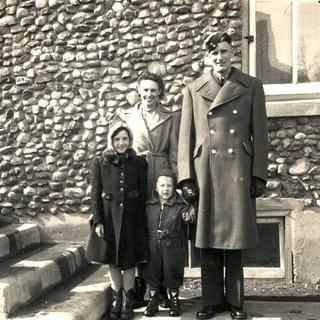Project focuses on “natural” and medicalized childbirth in mid-to-late 20th century Canada.
Building on a decade of work on the histories of women's health, bodies and pain, Dr. Whitney Wood, VIU’s Canada Research Chair in the Historical Dimensions of Women’s Health, is exploring changing attitudes towards childbirth in mid-to-late 20th century Canada.
Beginning in the 1930s, and especially in the postwar decades, a growing number of Canadians began seeking out what they perceived as a new and less medicalized way to give birth – one with decreased interventions, particularly the use of anesthesia, that enabled the labouring mother to be awake and alert at the moment of delivery.
“My first major project focused on the medicalization of childbirth and the growing use of obstetric anaesthesia during the late-19th and early-20th century, a key period of Canadian medical history and the professionalization of obstetrics,” says Wood. “Looking at the pushback against this medicalization, and the growth of a distinct natural childbirth movement in 20th century Canada, was a logical outgrowth of this.”
In preliminary research for her latest project, “Changing Childbirth in Postwar Canada, 1945-2000,” Wood has found that early natural childbirth often included several medical interventions, demonstrating how the use of the word “natural” – in reference to women's bodies, birth experiences and motherhood – is a slippery and malleable term, filled with different meanings in different contexts. These varying definitions factor into her research.
“My research fundamentally aims to help us understand why certain groups of women come to have the choices they have, or, more troublingly, why many women continue to lack access to certain care options, when it comes to giving birth in 21st century Canada,” says Wood.
Throughout her project, Wood, along with the support of VIU undergraduate students who work as research assistants, has been analyzing medical journals, the archival records of physicians, natural childbirth promoters and feminist organizations, and newspaper archives. Research also involves poring over digitized back issues of Chatelaine and the Ladies Home Journal, included in the Women's Magazine Archive, which reveal how medical experts and women themselves understood pregnancy and childbirth during the period under study.
Policy-makers, health practitioners, academic researchers and women as medical consumers stand to benefit from Wood’s latest research, funded by a new $44,016 Insight Development Grant from the Social Sciences and Humanities Research Council (SSHRC).
This grant will allow Wood to continue to engage VIU students in research, and to expand her project to include a transnational perspective, looking at how Canadian understandings of childbirth compared with those in Australia, New Zealand, the United Kingdom and the United States. With the support of SSHRC funds, Wood looks forward to completing Canadian and international archival research in 2022, with knowledge dissemination activities planned for late-2022 and 2023.
-30-
Media Contact:
Rachel Stern, Communications Officer, Vancouver Island University
C: 250.618.0373 l E: Rachel.Stern@viu.ca | T: @VIUNews





